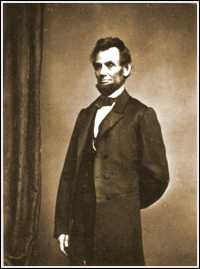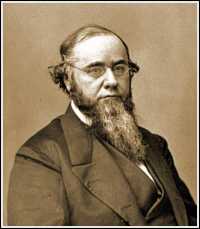Edwin McMasters Stanton (1814-1869)
Lincoln's Administration
 With the new administration of President
Lincoln came a new cabinet. Edwin
Stanton stepped aside but was eager to serve the new president in whatever
capacity he was called on do to. Incompetence by Secretary of War Simeon
Camerom lead Lincoln to look for another Secretary of War, strong urging by
Treasury Secretary Chase and Secretary of State William Seward secured the
position for Stanton. Although it meant giving up his private practice and a
salary of nearly fifty thousand dollars a year, Stanton accepted the post and
a salary of eight thousand dollars on January 20,1862 as his patriotic duty.
With the new administration of President
Lincoln came a new cabinet. Edwin
Stanton stepped aside but was eager to serve the new president in whatever
capacity he was called on do to. Incompetence by Secretary of War Simeon
Camerom lead Lincoln to look for another Secretary of War, strong urging by
Treasury Secretary Chase and Secretary of State William Seward secured the
position for Stanton. Although it meant giving up his private practice and a
salary of nearly fifty thousand dollars a year, Stanton accepted the post and
a salary of eight thousand dollars on January 20,1862 as his patriotic duty.
Immediately Stanton went to work cleaning the graft and favoritism of state contacts from the War Department. He required bids for all contracts to be in writing and with competitive bidding with loyal suppliers. One of the first important changes he made was to have the telegraph office moved to the War Department where he would know the news from the battlefield before anyone else. Even Lincoln had to go to the War office to get the news.
With allegations that Stanton failed to provide adequate medical care and sufficient weapons for the Armies, Stanton enemies pressed for his removal from the cabinet in the summer of 1862.
One of the issues Stanton refused to commit himself to was the fate of the Negroes. In his heart he agreed with the only member of the cabinet who though that the Negro question should not be avoided. The radial republican Chase insisted that it was senseless to combat a rebellion while upholding the evil that had caused it. Stanton again played a duel role while he sided with Chase he had to side with the majority North opinion if he were to get the needed supplies and men he needed. Winning the war was the single most important cause to Stanton as well as for Lincoln and this common desire bonded the two men close.
On July 17, 1862 Lincoln signed into the law a second Confiscation Act which declared all fugitive, captured and abandoned slaves free and the act allowed the president to employ the Negroes in the suppression of the rebellion. Stanton recommended using Negro troops as fighting men but Lincoln did not think the time was right. So without the knowledge of the president Stanton allowed Union General David Hunter to arm Negroes on the agreement that Hunter would take the responsibility if questioned by Congress. Which he was and he did. Stanton went so far in denying knowledge of Hunters actions that he would not authorize pay for the black soldiers
Lincoln reconsidered the need for enlistment of black troops in the Union Army in January 1863, as a military necessity and the logical consequence of emancipation. The issuance of the Emancipation Proclamation and the allowance of Negro troops wiped out the major differences between Lincoln and Stanton. Negroes rushed to the join the Union Army in such force that Stanton had to create the Bureau pf Colored Troops in the war department. The secretary of war fixed the salaries of the colored troops at ten dollars a month with three dollars paid in clothing. The same white soldiers were paid thirteen dollars and clothing.
Congress provided for a national draft in March of 1863. The conscription act was be administered by a military office, a Provost Marshal General of the Army, a separate bureau of the War Department. Unsuccessfully Stanton protested one feature of the enrollment act of 1863. It was not appealed until a year later. The act provided men to obtain an exemption for the draft by paying three hundred dollars commutation or furnishing a substitute.
 The draft riots of July in New York were mildly condoned by Governor
Seymour. He justified his attitude towards the riots and his opposition to
the conscription act on the grounds it was unconstitutional. Lincoln said he
could not wait for the Supreme Court to decide the legality of the act, the
war needed men.
The draft riots of July in New York were mildly condoned by Governor
Seymour. He justified his attitude towards the riots and his opposition to
the conscription act on the grounds it was unconstitutional. Lincoln said he
could not wait for the Supreme Court to decide the legality of the act, the
war needed men.
With the fall elections rapidly approaching the Republicans were worried about the slow progress of the war and the internal strife within the Cabinet since the resignation of the Secretary of the Treasury Salmon P. Chase had been accepted. Many people felt that if Lincoln were to replace his Secretary of War he would improve his chances at re-election. Lincoln in order to satisfy the radical republicans still hurting at Chases dismissal sacrificed Post master Montgomery Blair, Stantons enemy in the cabinet. The radicals concluded that Lincoln was their lone hope. The Democrats nominated General McClellan. Their platform called for immediate cessation of the war and a negotiated peace on the basis of the Federal Union of the States. Lincoln with his new vice presidential running mate Governor Andrew Johnson of Tennessee won decisively with 2,203,831 votes to McClellans 1,797,019.
The death of Chief Justice Roger Brooke Taney left open a position in the Supreme Court in October. Stanton had secretly desired the position of Chief Justice. Many supporters of Stanton urged the President to consider him to the Judgeship but Lincoln needed Stanton in the War Department. It was Grant fears of another Secretary of War that convinced Lincoln to keep Stanton in the War department and nominate Salmon P. Chase as Chief Justice.
With the fall of Richmond Stanton tended his resignation as he had told Chase he would do as soon as Richmond fell and Lee surrendered. Lincoln refused and Stanton reluctantly agreed to stay on for awhile longer, although he longed for a long rest after the numerous illnesses he had suffered during the last year of the war.
When Salmon P Chase was Secretary of the Treasury he had been accused of being lax in the way he handled the cotton permits which allowed some trading with the south to keep the cotton mills in the north active. The capture of a Confederate blockade runner in 1864 threatened to discredit Chase who had just been appointed Chief Justice and Lincoln would have suffered from the scandal; Chases son-in-law Senator William Sprague of Rhode Island was implicated in a scheme of running guns through though Texas were they were exchanged for cotton for Spragues cotton mill back in Cranston, Rhode Island. The act if true would have been treason. Stanton for the sake of his party, Lincoln and his friend Chase, hushed the matter and the damning evidence disappeared from the War Department.
